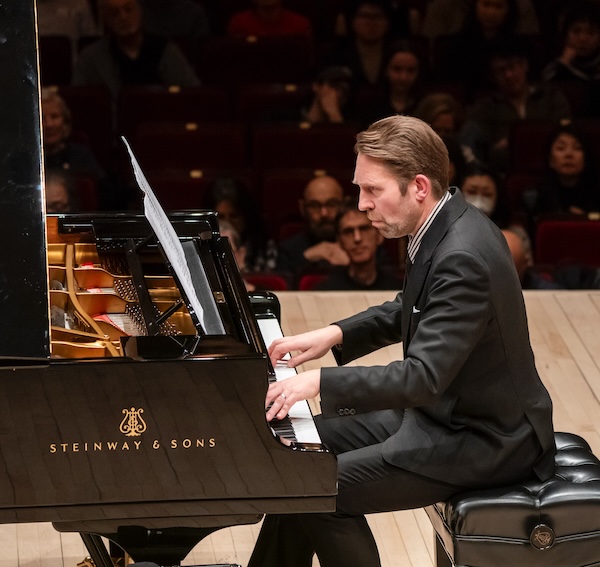Performances
Orquesta Sinfónica de Minería serves up a lively evening in West Palm Beach
The trumpet virtuoso Pacho Flores, a product of Venezuela’s famous El […]
Political piano in DC: Levit speaks out through Rzewski and Beethoven
The celebration of America’s 250th birthday is getting an early start […]
Nelsons, cast and BSO give heartfelt and idiomatic advocacy to Barber’s “Vanessa”
Happiness, George Burns once quipped, is having a large, loving, caring, […]
Concert review
Light, warmth and mastery from Andsnes at Carnegie Hall
Tuesday night was frigid but there was ample warmth in Carnegie Hall, emanating from the stage where pianist Leif Ove Andsnes was playing. The crowd was unusually thin, likely due to the weather, but those in attendance heard the expected standard from Andsnes: scintillating pianism and marvelous artistry.
A colleague in attendance declared Andsnes a “perfect pianist,” and that seemed a true statement. Playing Schumann, Kurtág, and Janáček, Andsnes showed his exquisite mix of technique and insight. This was a seamless and transparent blending of the two, his thoughts flowing through his hands so vibrantly and organically that there seemed a Zen-like quality, with nothing between the pianist, the keys, and the music.
In the first half, he played Schumann’s Klavierstücke, Op. 32, seven selections from Kurtág’s Játékok, then Book I of Janáček’s On an Overgrown Path. The second half had Schumann’s Carnaval, Op. 9.
Intermission seemed a rote formality, although the piano was retuned and the lid raised to full stick in this beautifully shaped and fully integrated program. Andsnes reinforced the unity with elegant and immediate segues between each work on the first half.
There are many ways to play Schumann, and Tuesday night Andsnes’ seemed like the only one that mattered. Every phrase had an absolutely clear shape and direction, as did each change in tempo—there were some dazzling accelerandos in Carnaval—the shifting viewpoints of “Florestan” were a superb example—that were both thrilling and sensible because by making everything so clear, everything sounded so sensible and natural.
The Klavierstücke was an absolute model for this, and dazzling as one doesn’t expect this to sound like a masterpiece. But the flowing details in every rhythm and phrases, each bit of rubato, and the tremendous sparkle and smooth legato coming off the keys offered such fine piano playing that it would make “Frere Jacques” sound extraordinary. Even the simple “Fughetto” was a thrill to hear.
Then, right into the mysteries and charm of the Játékok selections. Andsnes started with the misty “Doina”, then a wild “Homage a Farkas Ferenc III.” These are miniatures, meant to be playful and slender, but they sliced like diamonds when they weren’t haunting, like the final “Hommage a George Kroll 70.”
The Kurtág ideally set up On an Overgrown Path. This was a ravishing, deeply beautiful performance. The music is full of uncanny atmospheres, a series of outer and inner landscapes. Andsnes’ playing was gorgeous, chords and sharp attacks ringing with air and force. His expression went deeper and deeper as the piece went along. What began as alluring to the ear became emotionally involving and piquant through “Words Fail!”, “Good Night!”, and the complex finale, “The Barn Owl Has Not Flown Away!”At the end, one felt the effect of the three pieces together as a Joyceian journey to a mysterious place, more Finnegan’s Wake than Ulysses.
Andsnes brought this back home, in a sense, with the return of Schumann in the second half. Carnaval was as fine as one could imagine, more “right” than one has heard. Andsnes’ tempos were on the quick side, but with dexterity like the insanely fast runs of “Papillons” and the unrushed see-saw chords of “Paganini.” “Chiarina” and “Estrella” were elegant and a touch bittersweet. If Andsnes underplayed the contrasts between the Eusebius and Florestan ideas, he made the whole thing sound like Schumann at his most personal and intimate.
The ovation at the end easily exceeded the size of the crowd, and Andsnes responded with two encores. The first was another display of weightless light and warmth, speed and ease; Chopin’s Tarantelle in A-Flat Major, Op. 43. Returning to the stage, he played Mozart’s Rondo in D Major, K.485. That was not only all charm, but became gentler and quieter as he neared the end, like a good night wish.
Leif Ove Andsnes will repeat the program 8 p.m. Friday at Boston’s Jordan Hall for Vivo Performing Arts. vivoperformingarts.org
Pianist Bruce Liu plays Liszt, Chopin, Beethoven and more, 8 p.m. Friday, February 20. carnegiehall.org
Articles
No slowing down for Gerard Schwarz, South Florida’s busiest conductor
When Gerard Schwarz was a teenage trumpet student, he dreamed of […]
Opera creators find the light of love amid the horror of “The Shining”
In their adaptation of Stephen King’s iconic 1977 novel The Shining, composer […]
News
Patrick Quigley to depart Seraphic Fire in 2026; James Bass will be his successor
The Seraphic Fire torch is being passed. Patrick Dupre Quigley, founder […]
Subscribe
![]() Subscribe via RSS
Subscribe via RSS
![]() Follow on Twitter
Follow on Twitter
